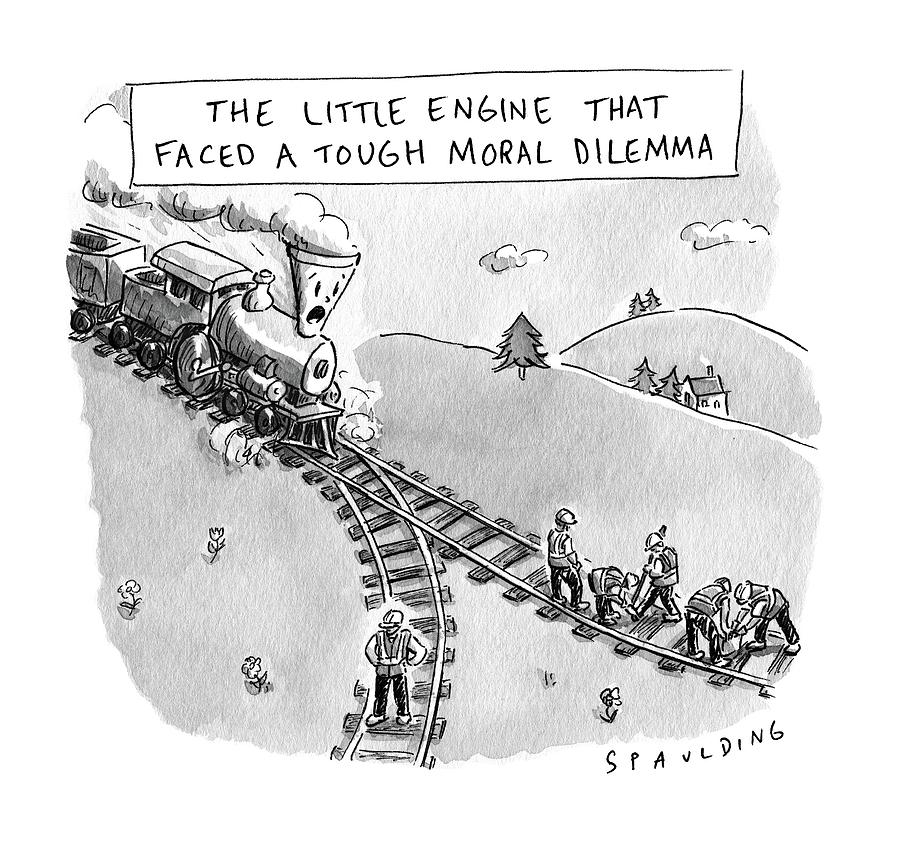In a world where the boundaries between right and wrong are a tapestry of complexity, the very essence of morality beckons us. Imagine a single decision that could alter the fate of many – a choice between the life of one and the lives of countless others. Welcome to the compelling realm of "The Moral Side of Murder," the opening chapter in the riveting lecture series, "Justice: What's The Right Thing To Do?" led by Professor Michael Sandel at Havard University. The Moral Side of Murder" entails a thought-provoking dialogue between Professor Michael Sandel and his students. The lecture is divided into two distinct segments: the first delves into the profound realm of morality, particularly in relation to the act of murder, while the latter tackles a compelling case study centered around cannibalism. In this journey through ethical intricacies, prepare to be gripped from the outset as we delve into the heart of human dilemmas and the quest for justice.
In the lecture, Michael Sandel introduces us to a thought experiment that vividly captures the complexities of ethical decision-making – the renowned "Trolley Problem." Envision yourself standing near a set of train tracks, an ominous trolley hurtling down the rails uncontrollably. Ahead, there are five people tied to the tracks, unable to move. You have the option to divert the trolley onto another track by pulling a lever. However, there is one person tied to the alternate track. In this situation, you face a moral decision: do you do nothing and allow the trolley to hit five people, or do you actively pull the lever, causing the death of one person to save five?
 |
| ▲ The Little Engine That Faced A Tough Moral Dilemma (Photo by Trevor Spaulding) |
From a consequentialist perspective, the ethical decision should be based on the consequences of each action. In this case, pulling the lever to divert the trolley would result in saving more lives (five) compared to doing nothing (one). One of the influential viewpoints within this thinking is the philosophy of utilitarianism, championed by Jeremy Bentham, an English philosopher from the 18th century. He proposed that the right thing to do, whether by an individual or a group, is to maximize the overall good – as he famously put it, "the greatest good for the greatest number." According to this approach, it can be seen as justified to commit an act of murder if it contributes to the well-being, benefit, and overall happiness of a larger group of people. However, these scenarios also expose the challenges of consequentialism. Consequentialism hinges on predicting outcomes, yet uncertainty often shrouds real-world consequences, making precise judgments difficult. Additionally, moral trade-offs arise when one must prioritize different ethical principles, casting a shadow on the straightforward application of the "greater good" principle.
As we move from the consequentialist viewpoint, which places paramount importance on outcomes and overall benefit, the shift to deontological ethics presents a contrasting stance. A deontologist might argue that the morality of an action lies in its intrinsic nature, regardless of its consequences. From this perspective, actively causing the death of one person, even to save five, is inherently wrong. Deontological principles, such as Kantian ethics (initiated by Emmanuel Kant – a 18th-century German philosopher), emphasize the importance of universal moral rules and the inherent dignity of each individual. Thus, the act of intentionally taking a life would be considered morally impermissible, regardless of the outcome. Human life's intrinsic value means murder is seen as absolutely wrong, regardless of potential benefits, upholding the duty to respect life and human dignity even in challenging situations. This perspective highlights the unchanging nature of moral principles and the balance between individual rights and collective well-being.
Moving forward, Sandel brings forth a gripping real-life story about cannibalism: "The Queen VS Dudley and Stephens." This tale recounts a chilling chapter where four individuals found themselves adrift at sea, grappling with starvation for days on end. Amidst this dire situation, Dudley suggested a weighty decision – a lottery to determine who would sacrifice their life to sustain the others. This idea did not work, leading to a desperate turn of events. Some days later, Dudley took the life of a severely ill member of the group (who was an adult orphan), and his body became sustenance for Dudley, Stephens, and Brook. The survivors were later rescued and faced legal repercussions upon their return to England. Once more, this discourse unfolds along divergent lines: whether the action of Dudley and friends is morally good or not. Amidst the conversation, a novel element emerges – the introduction of the concept of consent. The notion arises that the act of murder might find moral validation through consent because Dudley's action involved ending a life without the individual's consent. The inclusion of the concept of consent into this narrative further adds layers to the discussion. The question emerges: If the person willingly agrees to be killed and consumed by their companions, does this transform the act into a morally acceptable one? This query serves as the crux of moral contention. While some argue that consent reshapes the ethical calculus, others raise valid concerns about the genuineness of such consent within the context of extreme adversity. Certainly, the lifeboat scenario presents a compelling exploration of the intricate interplay between moral trade-offs and the tension between individual rights and collective well-being. This poses a profound moral quandary, as the value of individual lives clashes with the imperative to maximize overall survival. This thought experiment encourages us to grapple with fundamental questions about the nature of morality, the limits of individual rights in exceptional circumstances, and the ethical obligations we owe to both ourselves and others. It reveals the complex choices that can emerge when core ethical principles clash, shedding light on the intricate calculus involved in making decisions that affect the lives of individuals and the collective.
 |
| ▲ Abstract Picture Describing The Complexity of Human (Photo by Jasmin Merdan) |
As we navigate this intricate web of morality, it becomes evident that ethical uncertainties and conflicting human thoughts are pervasive challenges. One compelling facet is the human proclivity to rationalize actions that might be deemed immoral from alternative viewpoints, a phenomenon that intertwines with cognitive biases to influence moral decision-making. These biases often lead to conflicting thoughts and inner struggles when confronted with ethical dilemmas. For example, in real-life scenarios, factors like personal relationships, proximity to, and knowledge of the individuals involved can further complicate moral decisions. Here, in the Trolly Scenario, if the one person tied to the alternate track is a close family member or a friend, individuals may find it even more challenging to pull the lever. Moreover, culture, religion, and philosophy emerge as monumental architects, each contributing unique perspectives to the mosaic of moral frameworks. Culture, for instance, imbues us with ingrained beliefs about what is right and wrong, often grounding our ethical judgments in a broader context. Therefore, different cultures and individuals may have differing views on the morality of the situation. Religion, with its diverse teachings and doctrines, contributes to the rich landscape of moral reasoning. It offers prescriptive guidelines that inform the behavior of adherents, yet interpretations within different religious traditions can be disparate and complex. Philosophy, too, casts a profound shadow, as various ethical theories furnish individuals with tools to navigate the labyrinth of moral choices. From utilitarianism's pursuit of the greatest good to deontology's focus on duty and principles, these philosophical paradigms shape our moral landscape. In the midst of this intricate tapestry, the lasting question lingers: how can individuals balance their individual moral values with the broader collective? This inquiry prompts us to recognize the richness of diverse human thought while seeking common ground for ethical exploration and deliberation. As we navigate this complex terrain, one thing remains clear: the intricacies of morality are inexhaustible, encouraging a continuous journey of contemplation, discourse, and growth.
"The Moral Side of Murder" presents a thought-provoking journey that probes the depths of human thought and ethical intricacy. Ultimately, these moral dilemmas challenge individuals to critically examine their ethical beliefs and consider the principles that guide moral reasoning in such difficult situations. From the compelling scenarios that challenge our intuitions to the clash between individual rights and collective welfare, we navigate the terrain of consequentialism and deontology, where outcomes contradict duties. Yet, it is the human inclination to rationalize actions, coupled with the sway of biases and the tapestry of societal values, that adds layers to this intricate exploration. This journey teaches us that justice is not a singular path but a dynamic quest, one that urges us to confront our biases, navigate conflicting perspectives, and engage in meaningful dialogue. In the end, the shade of murder morality challenges us to dig deeper, fostering discussions, considering alternative viewpoints, and embracing the complexity that underpins the essence of human ethics.
Đinh Phương Thảo dankookherald@gmail.com

![[Campus Magnifier] Let's Surf the Library!](/news/photo/202404/12496_1765_4143.jpg) [Campus Magnifier] Let's Surf the Library!
[Campus Magnifier] Let's Surf the Library!
![[Campus Magnifier] Let's Surf the Library!](/news/thumbnail/202404/12496_1765_4143_v150.jpg)





